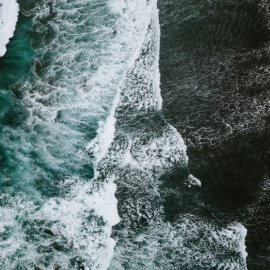Confluence
-
English
-
ListenPause
[intro music] Welcome to World Ocean Radio… I’m Peter Neill, Director of the World Ocean Observatory. I read somewhere that the ocean is the confluence of 1,000 rivers. Confluence. Coming together, a weaving of strands -- of hemp for rope to haul and lift, as lengths of wire for cable to hold bridges between two shores. There is an entwining of material and force inherent in ocean circulation that begins at the mountain-top and descends from glaciers and springs to those 1,000 rivers through watershed to wetland, from crest to coast, to then mix as energy and exchange, as a living entity from which value may be extracted and transformed by human intervention. We must understand this dynamic system as both natural and social, as both political and inclusive. When we do, we enter and move with the flow, efficient transport of everything from force and food. and, today, pollutants and poisons. The Galapagos Islands became a magnificent concentration of biodiversity as a result of such currents, that wealth threatened in our time by foul, chemicals and toxins efficiently distributed as illegal, unregulated discharge from industry and human excess far away. There is this notion that the ocean by virtue of its vast extent and volume can encompass and dilute such poisons and so it is fine that we dump sewerage there, or fracking residue, or obsolete ships, or nuclear waste, or plastic, plastic, plastic. That has been proven wrong and wrong-headed. The plume of radio—active water from the Takeshima tsunami accident in Japan extended to the west coast of the United States in a few weeks. The toxic dust from mining in Australia finds its way to deposit so remotely away on Antarctic ice in just a few weeks more. And the circulation goes in several ways, not just in a circular oceanic gyre, but also up into the atmosphere where different currents distribute in contrapuntal ways, and down into the water column to the seabed where marine communities are disrupted by vertical circulation into sediment unreachable by the human hand. The sea connects all things is more than a glib statement, but is rather a fundamental, determining fact. Culture can be exchanged by the same forces. The most compelling example is slavery, the involuntary emigration of African people in massive number from home to another home, to tyranny, exploitation, and lasting racial bias, violence, lynching, and exclusion from integrated society and opportunity. That this transit of human life brought with it an astonishing contribution to cultural life is sometimes recognized, mostly forgotten in the social maelstrom of race relations. Without Africa, America would have no soul – not just soul as music that has transformed our world but also as a manifestation of community that is at once protective and redeeming. For chattel slaves or refugees from modern tyranny, the ocean has been too a mixing medium. So many died, and continue to die, in what might have been an exercise of freedom and opportunity. Our welcome was not equitable, moral, or meaningful. Plantations or camps. Masters or violent police. We live in the aftermath of bias; it is on our conscience; it is an outcome of injustice that must be reversed. The ocean is a great equalizer. It is prejudiced against all who dare; it is sustaining to all who care to live equitably within its fluid boundaries. It changes all the time, just as does our history, but survival at sea was, and remains, an exercise of intent and skill, a resolve to adapt and cooperate against challenges that tax experience and sometimes defy imagination. The ocean is isolating as a purely natural place, but it is more truly a scape for human action and endeavor. To be successful in such a medium demands respect, collaboration, agreement, equity, reciprocity, and love. There is realism and wisdom there. And we should pay attention. Can we learn from this? Can we learn from the circumstance we face today: the perversity of pandemic and prejudice? Can we let the ocean teach us? Can we listen? Can we change? Can we understand that community, on land or sea, is about coming together, living together in welcome and peace? In a global confluence defined by the unity of 1,000 rivers. We will discuss these issues, and more, in future editions of World Ocean Radio. [outro music]
This week on World Ocean Radio host Peter Neill asks us to look to the ocean during these turbulent times of social unrest, to recognize the ocean as at times a connector and circulator of slaves and refugees, but now also as the great equalizer and unifier for all who care to live collaboratively, in agreement, with equity and reciprocity.
About World Ocean Radio
A weekly audio broadcast of five-minute essays covering a broad spectrum of ocean issues from science and education to advocacy and exemplary projects. World Ocean Radio, a project of the World Ocean Observatory is available for syndicated use at no cost by college and community radio stations worldwide. Contact [email protected] if you are interested in becoming an affiliate or know of a radio station that should be broadcasting these episodes each week.
Credit
Annie Spratt on Unsplash
- Login to post comments



